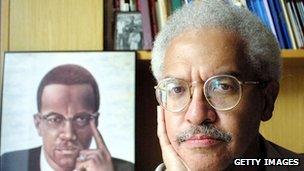Pulitzer Prize board drop 2012 fiction prize
- Published
- comments

Manning Marable's Malcolm X biography won the history prize
The Pulitzer Prize board has failed to select a winner of the award for fiction for the first time in 35 years.
Having narrowed the field down to three novels, Pulitzer Prize administrator, Sig Gissler, said none of the works received a majority from the panel.
"Thus after lengthy consideration, no prize was awarded," he said.
The books in contention were David Foster Wallace's The Pale King, Karen Russell's Swamplandia and Denis Johnson's novella Train Dreams.
Gissler added: "There were multiple factors involved in these decisions, and we don't discuss in detail why a prize is given or not given."
Paul Bogaards, director of publicity at Alfred A Knopf, Swamplandia's publisher, expressed his disappointment.
"It's the most significant award in American letters and it's a shame the jury couldn't find a work of fiction this year," he said.
"The Pulitzer makes sales. It's a prize that can change the career trajectory of a writer," he added.
The prestigious US fiction award is often matched by a big sales boost - previous winners include classics such as Harper Lee's To Kill A Mockingbird and John Updike's Rabbit at Rest.
'Brilliant novels'
The winner receives $10,000 (£6,285).
Jane Smiley, who won the Pulitzer fiction prize in 1992 for A Thousand Acres, was unimpressed.
"I can't believe there wasn't a worthy one. It's a shame. But sometimes a selection committee really cannot agree, and giving no award is the outcome. Too bad," she wrote in an email to the Associated Press (AP).
But Michael Pietsch of Little, Brown and Company, the editor of The Pale King, said: "It's wonderful that the Pulitzer nominating committee recommended The Pale King to the judges.
"Anything that brings the readers to David's brilliant novels, especially his great novel Infinite Jest, is a good thing."
The Pale King was assembled from notes Foster Wallace left behind at the time of his suicide in 2008.
Susan Larson, chairwoman of the Pulitzer fiction jury, said it was not up to the jury to select a winner, only to shortlist three finalists.
"The decision not to award the prize this year rests solely with the Pulitzer board," she wrote in an email to AP.
The prize in general non-fiction went to The Swerve: How the World Became Modern by Stephen Greenblatt.
Malcolm X: A Life of Reinvention by Manning Marable, the Columbia University historian who died on the eve of its publication, won the history category.
The biography prize went to Yale professor John Lewis Gaddis's George F. Kennan: An American Life.
Tracy Smith won the poetry prize for her collection Life on Mars.
- Published16 April 2012
- Published18 April 2011